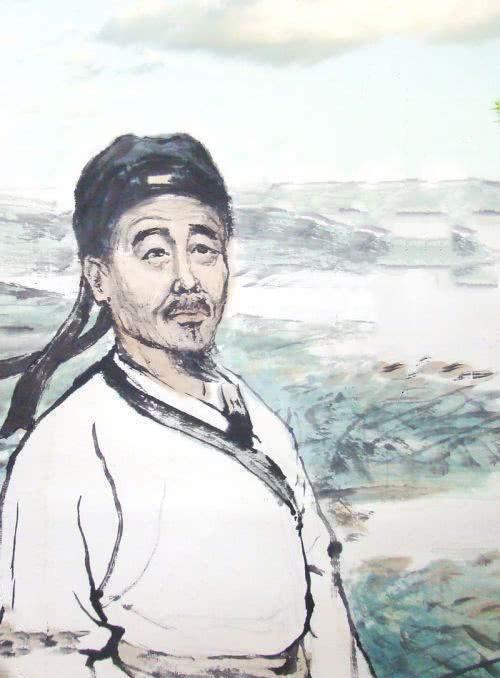Every day poetry hunting, pay attention to the reading dogs!
The late Tang Dynasty poet Luo Yin, who participated in the imperial examination from the age of more than twenty, even took the exam more than ten times and was named Luosun Mountain, known as "ten on the first". Although he was repeatedly frustrated in the field, Luo Yin's poetic talent was well known to the whole world. At that time, the poetry circle referred to Luo Yin, Li Shangyin and Wen Tingjun as the "Three Talents".
It is said that when the prime minister ordered the son of the fox to ascend to the throne, Luo Yin wrote a poem congratulating him. Ling Fox said happily to his son, "I don't like Ru and the first, but I like Ru to have a deaf ear." It can be seen that Luo Yin's poetry was highly respected by the world at that time. However, such a talented person could not pass the entrance examination, and it is conceivable how corrupt and dark the imperial court of the late Tang Dynasty was.
Luo Yin was not in the right place in his life, and he witnessed the corruption of the late Tang Dynasty court and the darkness of society, so he wrote many satirical poems. He even wrote the "Book of Hunger" and the "Two Books of the Same", trying his best to expose and criticize social reality, which can be described as the most powerful satirical poet of the late Tang Dynasty.

Because Luo Yin's poetry is easy to use, and most of them criticize social reality and speak for the people at the bottom, they are widely spread in the folk, and many poems are still popular today. The most classic is the following "Bee":
bee
Don Rohan
Whether it is flat or mountain tip,
The infinite scenery is occupied.
After harvesting a hundred flowers into nectar,
For whom is it sweet for whom?
Many late Tang dynasty poets have written satirical poems, such as Du Mu's "Merchant Women Don't Know how to Hate the Fallen Country, Sing backyard Flowers Across the River", Li Shangyin's "Poor Night Half Empty Seat, Don't Ask the Ghosts and Gods", Gao Toad's "A Piece of Sadness Can't Be Painted" and so on are more metaphorical political satire poems to stab the chaos of the late Tang Dynasty and the decline of the empire.
Luo Yin's satirical poems are different, he often speaks out for the common people and working people at the bottom, exposing and criticizing social realities such as heavy taxes and the gap between the rich and the poor. For example, one of his yongxue poems: "Chang'an is more poor, it is not more for Rui", and this "Bee" is one of the classics, and it has also been selected into the primary school textbook.
This poem continues Luo Yin's colloquial and easy-to-use language style, and the whole text is like a vernacular, and at the same time, it also supports the irony of the object. The object of the chant is the "bee" in the title, and the first two sentences of the poem describe the environment in which the bees live: "Regardless of the flat land or the tip of the mountain, the infinite scenery is occupied."
The bees occupy a beautiful and vast space in their hard work, and they are depicted plainly and plainly, revealing their appreciation and praise for the bees. The beginning seems to be praise, but in fact it is first promoted and then suppressed, paving the way for the irony of the following text.
The last two sentences "After harvesting a hundred flowers into nectar, for whom is it sweet for whom"? The bees worked hard and finally "harvested a hundred flowers into nectar", but who did this nectar eventually fall into? For whom are the bees working so hard? The irony is self-evident!
The bees naturally symbolize the vast number of working people, who, like the bees, "take advantage of the scenery", cultivate and work in the vast and endless fields, but the harvest of grain is ultimately cheaper than the exploiters such as the bureaucratic sovereigns! This is the reality since ancient times, and the poet borrows the image of the bee to give a strong satire and criticism of social reality.
The laborers have nothing to gain, and those who gain do not work, which is exactly the social reality implied by "after harvesting a hundred flowers into honey, for whom to work hard and for whom to be sweet". From ancient times to the present, such a social reality may have eased, but it has never been completely changed. Luo Yin was frustrated and fell into the hands of his subordinates, so he had a deeper understanding of the low-level society of the late Tang Dynasty, so he wrote this poem, which not only satirized the exploiters who did not earn for nothing, but also cried out for the hard-working people at the bottom. It is worthy of being the most powerful satirical poet of the late Tang Dynasty!